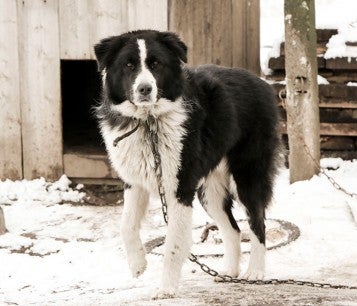In many areas, winter is a season of bitter cold and numbing wetness. Make sure your four-footed family members stay safe and warm by following these simple guidelines.
Keep pets sheltered
Keep your pets inside with you and your family. Under no circumstances should pet cats be left outdoors, even if they roam outside during other seasons. Dogs are happiest when taken out frequently for walks and exercise, but kept inside the rest of the time. Don't leave pets outdoors when the temperature drops.
If your dog is outdoors much of the day for any reason, they must be protected by a dry, draft-free shelter that is large enough to allow them to move comfortably, but small enough to hold in body heat. The floor should be raised a few inches from the ground and covered with cedar shavings or straw. The doorway should be covered with waterproof burlap or heavy plastic.
Pets who spend a lot of time outdoors need more food in the winter because keeping warm depletes energy. Routinely check your pet's water dish to make certain the water is fresh and unfrozen. Use plastic food and water bowls; when the temperature is low, your pet's tongue can stick and freeze to metal.
Bundle up, wipe down
No matter what the temperature is, windchill can threaten a pet's life. Exposed skin on noses, ears and paw pads are at risk for frostbite and hypothermia during extreme cold snaps. For this reason, short-haired dogs often feel more comfortable wearing a sweater—even during short walks.
Rock salt and other chemicals used to melt snow and ice can irritate the pads of your pet's feet. Wipe all paws with a damp towel before your pet licks them and irritates their mouth.
Sign up to receive our exclusive e-book full of important information about caring for your pet, including training techniques and answers to frequently asked questions.

Remove common poisons
Antifreeze is a deadly poison, but it has a sweet taste that may attract animals and children. Wipe up any antifreeze spills immediately and keep it, like all household chemicals, out of reach. Coolants and antifreeze made with propylene glycol are less toxic to pets, wildlife and family.
Dogs are at particular risk of salt poisoning in winter due to the rock salt used in many areas—often when licking it from their paws after a walk. Store de-icing salt in a safe place and wipe your dog’s paws, even after short walks. If your dog ingests rock salt, call a veterinarian immediately.
Commit to supporting dogs who live outdoors during cold weather by advocating to ensure that every dog has access to a shelter that keeps them warm enough and provides protection from the elements.

Protect outdoor animals
If there are outdoor cats, either owned pets or community cats in your area, remember that they need protection from the elements as well as food and water. It's easy to give them a hand.
You can make your own cat shelter quickly and easily with a plastic tub.
Cars are one of many hazards to small animals—warm engines in parked cars attract cats and small wildlife, who may crawl up under the hood. To avoid injuring any hidden animals, bang on your car's hood to scare them away before starting your engine.
You can also help make your property safe for deer in the wintertime by waiting until after the first week of December to string lights, and after then, only on trees over six inches in diameter. Before the first snow, you should also store summer recreational materials, like hammocks and swings.
Horse care
Be sure your horses have access to a barn or a three-sided run-in so they can escape the wind and cold. While not all horses will need to be blanketed, blankets will help horses keep warm and dry, especially if there is any rain or snow. If you’ve body-clipped your horses, keep them blanketed throughout the winter.
Give your horses access to unfrozen water at all times. You can use heated buckets or water heaters/de-icers to make sure the water doesn’t freeze. Also, be sure to feed your horses more forage—unlimited amounts, if possible—during extreme cold. This will help your horses create heat and regulate their body temperatures.
Speak out
If you encounter a pet left in the cold, politely let the owner know you're concerned. Some people genuinely don’t know the risk that cold weather poses to their pets or livestock and will be quick to correct any problems you address. If someone you raise these concerns with responds poorly or continues to neglect their animals, follow our steps on reporting winter neglect.

